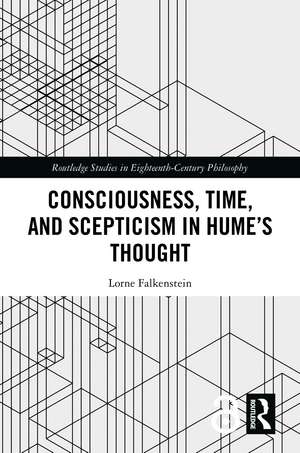Consciousness, Time, and Scepticism in Hume’s Thought: Routledge Studies in Eighteenth-Century Philosophy
Autor Lorne Falkensteinen Limba Engleză Hardback – 2 apr 2024
In making this case, this book develops Humean positions on topics Hume did not discuss in detail but that are of interest to contemporary philosophers: consciousness and the unity of consciousness, temporal experience, visual spatial perception, the experience of colour and other qualia, objective experience, and spatially extended minds. It also challenges currently accepted interpretations of Hume’s views on the finite divisibility of space and time, vacuum, the duration of unchanging objects, and identity over time. It deals with criticisms of Hume that were raised by his contemporaries, notably by Thomas Reid, draws attention to earlier seventeenth‑ and eighteenth‑century work that has bearing on the interpretation of Hume’s thought, and compares Hume’s achievements with those of later nineteenth‑century psychologists and philosophers.
Consciousness, Time, and Scepticism in Hume’s Thought will appeal to scholars and advanced students interested in Hume, history of philosophy, and early modern theories of perception, time, and consciousness.
The Introduction and Chapter 1 of this book are freely available as downloadable Open Access PDFs at http://www.taylorfrancis.com under a Creative Commons Attribution-Non Commercial-No Derivatives CC-BY-NC-ND 4.0 license.
Din seria Routledge Studies in Eighteenth-Century Philosophy
-
 Preț: 326.49 lei
Preț: 326.49 lei -
 Preț: 311.33 lei
Preț: 311.33 lei -
 Preț: 311.41 lei
Preț: 311.41 lei - 9%
 Preț: 934.94 lei
Preț: 934.94 lei -
 Preț: 389.66 lei
Preț: 389.66 lei -
 Preț: 383.63 lei
Preț: 383.63 lei -
 Preț: 447.17 lei
Preț: 447.17 lei -
 Preț: 482.78 lei
Preț: 482.78 lei -
 Preț: 436.14 lei
Preț: 436.14 lei -
 Preț: 389.66 lei
Preț: 389.66 lei - 18%
 Preț: 1001.84 lei
Preț: 1001.84 lei - 16%
 Preț: 276.49 lei
Preț: 276.49 lei -
 Preț: 326.49 lei
Preț: 326.49 lei -
 Preț: 410.46 lei
Preț: 410.46 lei -
 Preț: 436.14 lei
Preț: 436.14 lei -
 Preț: 427.95 lei
Preț: 427.95 lei - 18%
 Preț: 890.74 lei
Preț: 890.74 lei -
 Preț: 405.66 lei
Preț: 405.66 lei - 17%
 Preț: 259.31 lei
Preț: 259.31 lei -
 Preț: 385.41 lei
Preț: 385.41 lei - 16%
 Preț: 275.88 lei
Preț: 275.88 lei - 18%
 Preț: 1002.80 lei
Preț: 1002.80 lei -
 Preț: 286.51 lei
Preț: 286.51 lei -
 Preț: 389.66 lei
Preț: 389.66 lei -
 Preț: 490.25 lei
Preț: 490.25 lei - 16%
 Preț: 260.13 lei
Preț: 260.13 lei - 18%
 Preț: 1000.27 lei
Preț: 1000.27 lei - 18%
 Preț: 882.69 lei
Preț: 882.69 lei -
 Preț: 432.20 lei
Preț: 432.20 lei - 18%
 Preț: 1005.17 lei
Preț: 1005.17 lei - 9%
 Preț: 870.32 lei
Preț: 870.32 lei
Preț: 1011.79 lei
Preț vechi: 1233.89 lei
-18% Nou
Puncte Express: 1518
Preț estimativ în valută:
193.62€ • 200.92$ • 161.84£
193.62€ • 200.92$ • 161.84£
Carte tipărită la comandă
Livrare economică 17-31 martie
Preluare comenzi: 021 569.72.76
Specificații
ISBN-13: 9781032677835
ISBN-10: 103267783X
Pagini: 338
Ilustrații: 4
Dimensiuni: 152 x 229 x 21 mm
Greutate: 0.78 kg
Ediția:1
Editura: Taylor & Francis
Colecția Routledge
Seria Routledge Studies in Eighteenth-Century Philosophy
Locul publicării:Oxford, United Kingdom
ISBN-10: 103267783X
Pagini: 338
Ilustrații: 4
Dimensiuni: 152 x 229 x 21 mm
Greutate: 0.78 kg
Ediția:1
Editura: Taylor & Francis
Colecția Routledge
Seria Routledge Studies in Eighteenth-Century Philosophy
Locul publicării:Oxford, United Kingdom
Public țintă
Postgraduate and Undergraduate AdvancedRecenzii
"A carefully crafted and detailed examination of some problems in Hume’s philosophy that have not received the attention they deserve. Falkenstein has provided an exacting analysis of the various relations between time, space and the mind in Hume’s philosophy, a gift to Hume scholarship."
Wade Robison, Rochester Institute of Technology, USA
"This book is an original, deep, and unfailingly valuable interpretation and interrogation of central aspects of Hume’s epistemology, metaphysics, and philosophy of mind. It merits and rewards close study."
Don Garrett, New York University, USA
Wade Robison, Rochester Institute of Technology, USA
"This book is an original, deep, and unfailingly valuable interpretation and interrogation of central aspects of Hume’s epistemology, metaphysics, and philosophy of mind. It merits and rewards close study."
Don Garrett, New York University, USA
Cuprins
Introduction. Hume’s remedy for unphilosophical belief 1. Impressions: colour, consciousness, temporal experience 2. Finite divisibility; manners of disposition; points 3. Time and our experience of time 4. Identity 5. The conception and perception of a vacuum 6. Belief: normativity; objects 7. Causes of the belief in bodies 8. Reasons for scepticism about the external existence of bodies Conclusion. Hume’s remedy
Notă biografică
Lorne Falkenstein is Emeritus Professor of Philosophy at Western University, Canada. He is a co‑author of Logic Works: A Rigorous Introduction to Formal Logic (Routledge: 2022), co‑editor of the Broadview editions of Hume’s Enquires, Dissertation, and Natural History (2011–13), and has written many articles on early modern philosophy.
Descriere
David Hume’s philosophical work presents the reader with a perplexing mix of constructive accounts of empirically guided belief and destructive sceptical arguments against all belief. This book reconciles this conflict by showing that Hume intended his scepticism to be remedial.
